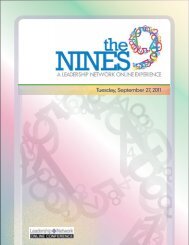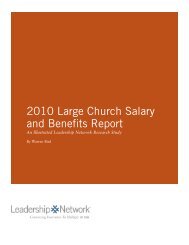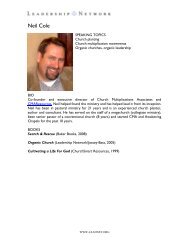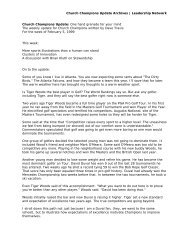ARE WE A PEOPLE AT HALF TIME? - Leadership Network
ARE WE A PEOPLE AT HALF TIME? - Leadership Network
ARE WE A PEOPLE AT HALF TIME? - Leadership Network
You also want an ePaper? Increase the reach of your titles
YUMPU automatically turns print PDFs into web optimized ePapers that Google loves.
It is apparent that the cultural relevance of<br />
new paradigm churches, including their<br />
contemporary style of evangelism, plays<br />
an important role in their growth and the<br />
strength of their members’ conversion<br />
experiences. By being culturally current,<br />
new paradigm churches aim to keep<br />
nonbelievers from feeling alienated by any<br />
style of dress or ritual associated with<br />
Christianity; instead, they want any<br />
objections to stem from the content of the<br />
teachings, which they refuse to compromise.<br />
In other words, while culturally current<br />
worship unquestionably attracts people to<br />
new paradigm churches, it is equally<br />
important to stress that conversion experiences<br />
focus on the message and not simply<br />
the form of Christianity. In short, the focus<br />
of new paradigm churches is on internal<br />
transformation as opposed to change in<br />
external appearance.<br />
A recurrent theme in our conversations<br />
was that the people encountered in new<br />
paradigm churches are somehow different<br />
from ordinary associates and friends. The<br />
term “real” frequently surfaced as a way of<br />
describing these Christians who seemed to<br />
lack the defensiveness and egocentricity<br />
that is so much a part of the human<br />
condition. One interviewee described his<br />
initial impressions of new paradigm<br />
Christians in this way: “I sensed that the<br />
people were real. The leadership here gave<br />
me the ability to meet God where I was at,<br />
or God met me where I was at.”<br />
At the core of these acculturation<br />
experiences is a radical change in focus<br />
from being self-directed to being Goddirected.<br />
This refocusing of one’s “center<br />
of value” is perhaps best understood as a<br />
basic openness to direction, or leading, by<br />
the Holy Spirit. In any case, many of these<br />
converts reveal a decided deemphasis on<br />
“self ” as typically understood within the<br />
psychological literature on self-fulfillment.<br />
The model instead is one of servanthood.<br />
At a practical level, there is considerable<br />
emphasis on personal discipline and<br />
responsibility, particularly to one’s family.<br />
Indeed, words such as discipleship and<br />
accountability are heard at every turn<br />
within these movements. New-paradigm<br />
churches are “high demand” institutions,<br />
however relaxed and contemporary their<br />
music and organizational structure may<br />
appear. They provide a structuring of<br />
mentoring and accountability for individuals<br />
who are serious about the tough challenges<br />
of changing their lives.<br />
Donald Miller (demiller@mizar.usc.edu) is a<br />
Professor of Religion at the University of<br />
Southern California. His book, The<br />
Reinventing of American Protestantism, is<br />
published by the University of California Press<br />
(1-800-822-6657) and retails for $27.50.<br />
Shortly after the release of his book,<br />
Donald Miller was interviewed by<br />
NEXT, and what follows are highlights<br />
of the interview.<br />
NEXT...What did you want to accomplish<br />
with this book<br />
MILLER...I wanted to<br />
know why Calvary Chapel<br />
could pack 2,200 teenagers<br />
into their church on Monday<br />
night, while my church—<br />
part of a mainline denomination—struggled<br />
to have a<br />
youth program with a dozen<br />
high school age students.<br />
Furthermore, I was well<br />
aware of the “graying” trend<br />
of mainline churches, and I<br />
was intrigued that Vineyard,<br />
Calvary and Hope were<br />
attracting large numbers of<br />
baby boomers and baby<br />
busters.<br />
NEXT...What did you learn in the<br />
process of writing the book<br />
MILLER...On my first visits with the<br />
leaders of these movements, I was struck<br />
by how non-defensive they were. I was<br />
given access to any meeting, was invited to<br />
speak with any staff member, and allowed<br />
to inspect any records. They had nothing to<br />
hide, and I think this “transparency” is<br />
what, in part, attracts people to new<br />
paradigm churches. People can be themselves,<br />
they can admit their problems, they<br />
can seek support and strength, there is no<br />
need to pretend that one is something other<br />
3<br />
than a person who needs forgiveness,<br />
love and a chance to be a part of an<br />
inter-dependent community.<br />
When I started my research, I assumed that<br />
liberals had something to teach those who<br />
were “less enlightened.” The further I<br />
moved into this research project, the more<br />
I saw that the opposite might be true:<br />
namely, the declining mainline churches<br />
might have something to learn from these<br />
religious “upstarts.”<br />
NEXT...Are you suggesting that this<br />
new paradigm of church will become<br />
the dominant paradigm in the next<br />
millennium<br />
MILLER...The religious ecology of<br />
America is much too complex for there to<br />
be only one dominant paradigm. I do<br />
expect, however, that denominational<br />
religion as we know it will decline in<br />
importance and the<br />
growth in American<br />
Christianity will be<br />
among churches that take<br />
seriously the need to present<br />
the gospel in a medium<br />
that connects<br />
culturally with its potential<br />
audience.<br />
NEXT...Please distinguish<br />
more clearly the<br />
differences between a<br />
“new paradigm” church<br />
and a “seeker-sensitive”<br />
church.<br />
MILLER...When I started<br />
writing this book, I<br />
began looking for a term<br />
that would describe these movements.<br />
Others have used “post-denominational” or<br />
“seeker-sensitive” church, but none hit me<br />
quite right. New paradigm church seems<br />
broader and more encompassing than<br />
seeker-sensitive.<br />
NEXT...To what degree is this new<br />
reformation tied to the Boomer and<br />
Buster generations Is it more generationally<br />
driven than culturally driven<br />
MILLER...I’m not certain that one can<br />
separate generational issues from cultural<br />
evolution. Indeed, the argument is that<br />
baby boomers have reshaped their culture,<br />
continued on page 4







